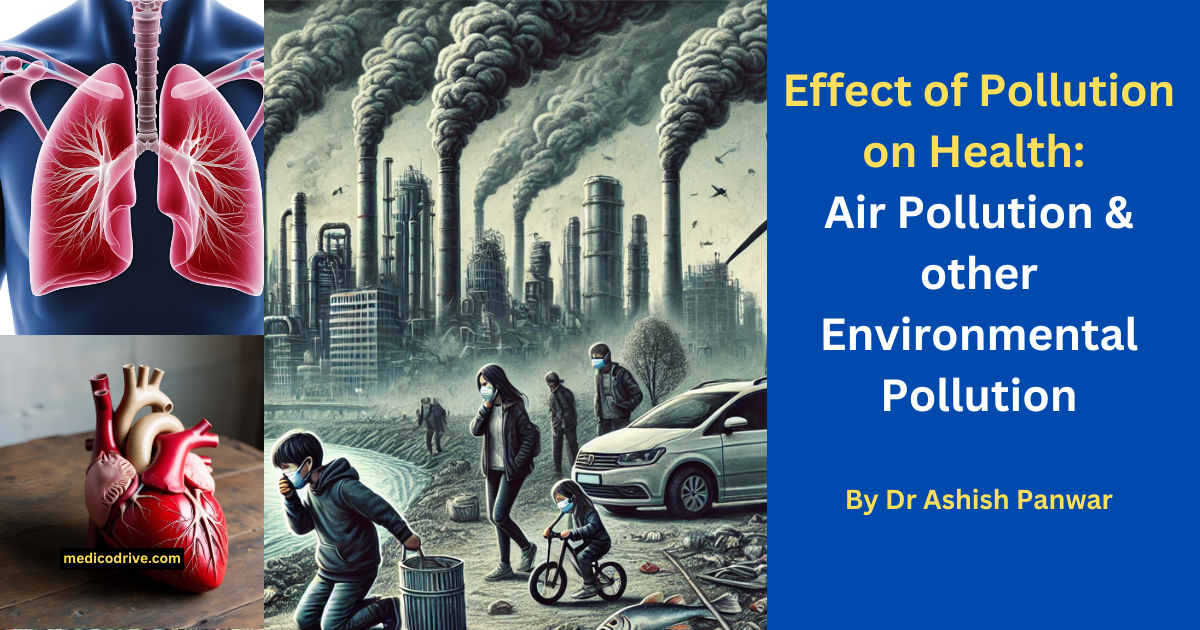Effect of Pollution on Health: Pollution is an important environmental issue that affects all living organisms, including humans. Extensive research illuminates the harmful consequences of pollution on human health. Studies indicate that exposure to pollutants increases the risk of respiratory diseases, heart disease, cancer and neurological disorders (read more in this article about effect of pollution on health). According to the World Health Organization (WHO), the air pollution alone is responsible for the deaths of around 7 million per year. In addition, pollution affects mental health and contributes to anxiety, depression and cognitive decline.

Types of pollution and their effects on Humans Health
1. Air pollution
What is Air pollution?, It is caused by emissions from natural sources such as industries, vehicles, domestic activities and fires. This includes harmful substances such as particulate matter (PM2.5 and PM10), nitrogen oxide, sulfur dioxide, carbon monoxide and volatile organic compounds. Now Effects of Air Pollution on Health…
Health effects:
- Respiratory disease: Chronic exposure to air pollution leads to asthma, chronic obstructive pulmonary disease (COPD), bronchitis and lung infection (WHO).
- Heart disease: Fine particulate matter (PM2.5) enters the bloodstream deep, which increases the risk of high blood pressure, heart attack and stroke (EPA).
- Neurological disorders: Growing research links air pollution to cognitive decline, dementia and neurodevelopmental problems (NIH) in children.
- Cancer: Long -term contact for carcinogens such as benzene and polycyclic aromatic hydrocarbon (PAH) increases the risk of lung cancer (IARC).
- Results of negative pregnancy: Pregnant women who are exposed to high pollution levels are at greater risk of premature birth, low birth weight and congenital disorders (CDC).
2. Water pollution
Effect of Water Pollution on Health: Industrial discharge, drainage, drainage of agriculture and plastic waste cause water pollution. The contaminants include heavy metal (lead, mercury, arsenic), pesticides, bacteria and chemicals.
Health effects:
- Gastrointestinal disease: contaminated water leads to diarrhea, cholera, dysentery and typhoid (CDC).
- Neurological disorders: Mercury through water affects the development of the brain, especially in children and fetuses (EPA).
- Kidney and liver damage: Heavy metal and chemical pollutants accumulate in the organs and cause chronic diseases (WHO).
- Endocrine disturbance: pesticides and pollution of plastic mimics mimic hormones, causing reproductive and metabolic disorders (NIH).
Download Effect of Pollution on Health Official PPT
3. Soil pollution
Soil pollution is the result of disposal of industrial waste, pesticides, fertilizers and heavy metals.
Health effects:
- Food pollution: Crops grown in contaminated soil absorb toxic elements, leading to food poisoning and long -term health problems.
- Skin disease: Direct contact with contaminated soil causes dermatitis, allergies and infections.
- Risk of cancer: Constant organic pollutants (pop) are associated with various cancer (UNEP).
4. Noise pollution
Noise pollution from traffic, industrial activities and urbanization disrupts human welfare.
Health effects:
- Hearing loss: Long -lasting contact for high decibels causes irreversible hearing damage.
- Stress and anxiety: Chronic noise exposure increases the level of stress hormone, causing anxiety, depression and sleep disorders.
- Cardiovascular problems: Studies suggest a link between noise pollution and hypertension, heart disease and stroke (WHO).
5. Light pollution
Excessive artificial light, especially at night, disturbs natural rhythm.
Health effects:
- Sleep disorder: dissolution of circadian rhythms leads to insomnia and poor quality of sleep.
- Hormonal imbalance: oppression of melatonin production affects immune function and metabolism.
Uncertain population
Some groups are receptive to the effect of pollution on health:
- Children: Development of organs and immune systems makes them more weak for respiratory and neurological damage (WHO).
- Elderly person: Existing health conditions increase pollution -related diseases.
- Pregnant women: Exposure to pollutants increases the risk of fetal development.
- Low -income society: often lives in very polluted areas with limited access to the health care system.
Strategies for Prevention of Pollution & Health Problems
- Legislative measures: Governments should implement strict rules for emissions, industrial waste management and environmental protection.
- Technical solutions: The level of pollution can be reduced by using renewable energy, electric vehicles and pollution control technologies.
- Public awareness campaign: Promoting permanent habits such as waste shortages, water conservation and responsible consumption can reduce pollution.
- Medical intervention: To increase the health care system to treat pollution -inspired diseases and provide protective measures to weak groups.
- Global cooperation: International cooperation is necessary to combat pollution through environmental agreements and joint research initiatives.
This article is written by Dr Ashish Panwar, he has verified all the facts and international studies before writing this article. One thing to mention is he takes various references from official websites, all the references links are given below, thanks for reading this article.
References for this article
- World Health Organization (WHO): Air Quality and Health
- Environmental Protection Agency (EPA): Effects of Particulate Matter
- National Institutes of Health (NIH): Air Pollution and Cognitive Decline
- International Agency for Research on Cancer (IARC): Air Pollution and Cancer
- United Nations Environment Programme (UNEP): Global Soil Pollution Assessment

Hello, I am Dr. Ashish. I have lot of experience in medical field and education, I have gained lot of knowledge in my entrance exam life and medical studies which I want to share with everyone so that I can help more and more people.